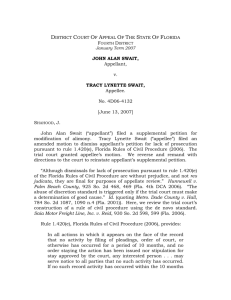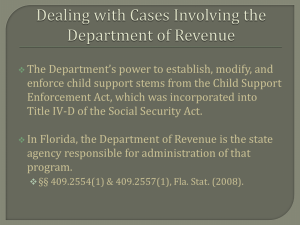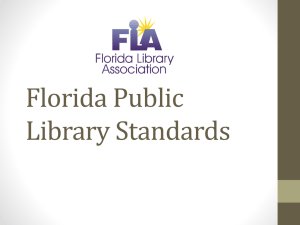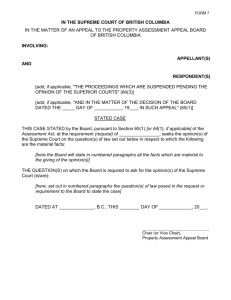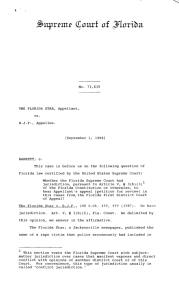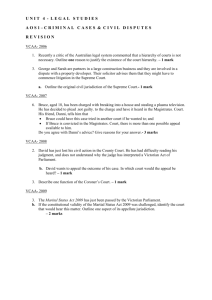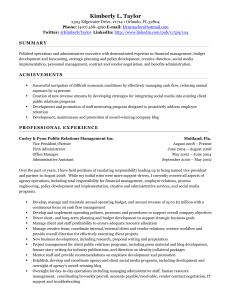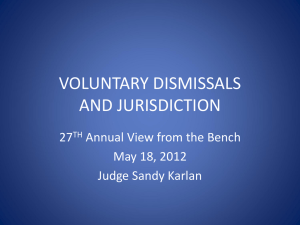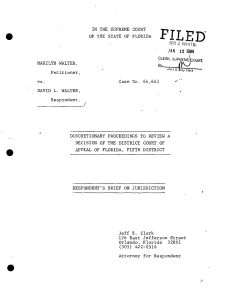THE FLORIDA STAR Appellant, B. J.F. --.
advertisement
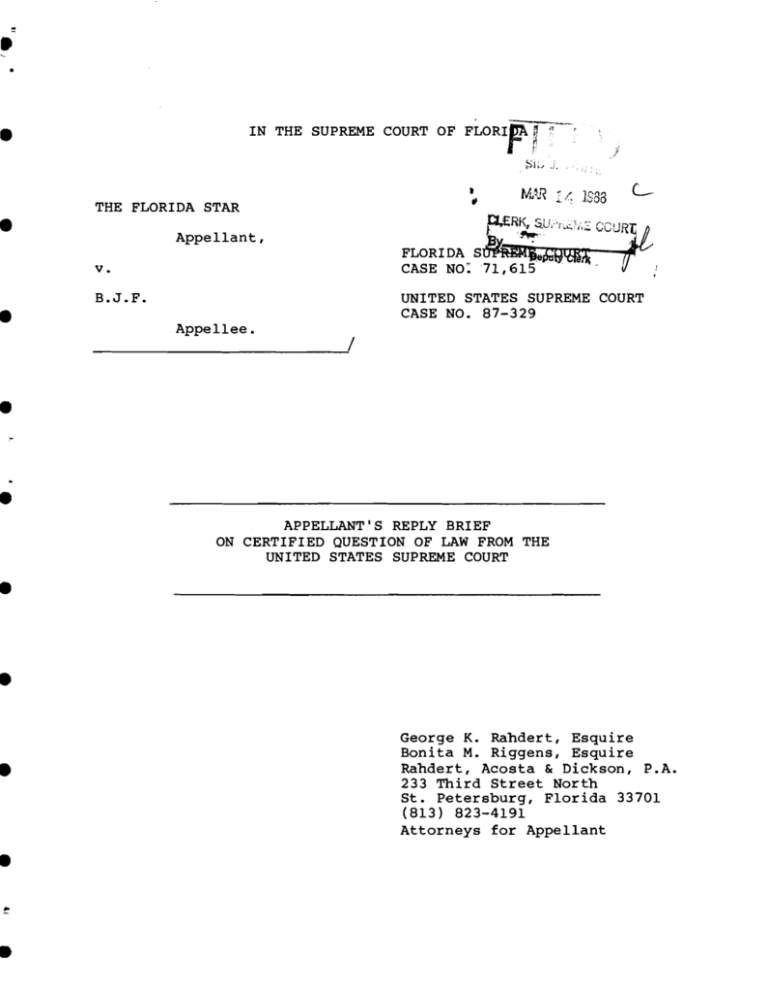
- IN THE SUPREME COURT OF FLORI --.- THE FLORIDA STAR Appellant, v. B. J.F. UNITED STATES SUPREME COURT CASE NO. 87-329 Appellee. / APPELLANT'S REPLY BRIEF ON CERTIFIED QUESTION OF LAW FROM THE UNITED STATES SUPREME COURT George K. Rahdert, Esquire Bonita M. Riggens, Esquire Rahdert, Acosta & Dickson, P.A. 233 Third Street North St. Petersburg, Florida 33701 (813) 823-4191 Attorneys for Appellant TABLE OF CONTENTS Page ................. STATEMENT OF THE CASE AND FACTS ........... TABLE OF AUTHORITIES ARGUMENT I. THIS COURT HAD JURISDICTION TO DETERMINE WHETHER TO GRANT DISCRETIONARY REVIEW UNDER ARTICLE V, SECTION 3(b)(3) ....... 11. THE LEGISLATIVE HISTORY OF THE 1980 CONSTITUTIONAL AMENDMENT REVEALS THE INTENT TO ELIMINATE FLORIDA SUPREME COURT JURISDICTION ONLY OVER THOSE DISTRICT COURT OF APPEAL DECISIONS WHICH ARE NOT ACCOMPANIED BY AN OPINION .......... 111. IV. ANSWERING THE CERTIFIED QUESTION TO THE EFFECT THAT THIS COURT'S ORDER DENYING DISCRETIONARY REVIEW IS A SUBSTANTIVE RULING ON THE MERITS OF JURISDICTION WILL CREATE HAVOC IN FLORIDA'S APPELLATE PROCESS. iii 1 2 5 . 6 This Court may wish to merely affirm its jurisdiction to conduct discretionary review and avoid delving into its private deliberate process ............ 11 The word "expressly" as contained within Article V, Section 3(b)(3) has been construed by this Court as requiring district court of appeal decisions to be accompanied by an opinion 12 This Court had conflict jurisdiction under Article V, Section 3(b)(3) of the Florida Constitution 13 THIS COURT HAD JURISDICTION PURSUANT TO ARTICLE V, SECTION 3(b)(3) OF THE FLORIDA CONSTITUTION TO REVIEW THE DECISION OF THE FIRST DISTRICT COURT OF APPEAL IN THE FLORIDA STAR v. B.J.F.,499 S0.2D 8 r (FLA. 1ST DCA 1986) A. B. ....... C. ........... D. E. This Court had jurisdiction under Article V, Section (3)(b)(3) of the Florida Constitution because the First District Court of Appeal's decision expressly declared Section 794.03, Florida Statutes to be valid.. .. This Court had jurisdiction under Article V, Section 3(b)(3) because the First District Court of Appeal's decision expressly construed provisions of the Florida and Federal Constitutions CERTIFICATE OF SERVICE. . . 13 13 TABLE OF AUTHORITIES PAGE Aetna Insurance Co. v. Buchanan, 372 So.2d 172 (Fla. 2nd DCA), cert. denied, 378 So.2d 342 (Fla. 1979) ...... 5 ............... 10 Chandler v. State, 366 So.2d 6 4 (Fla. 3rd DCA 1978), cert denied, 376 So.2d 1157 (Fla. 1979), affirmed, 449 U.S. 560, 101 S.Ct. 802, 66 L.Ed 2d 740 (1981) Ford Motor Co. v. Kikis, 401 So.2d 1341 (Fla. 1981). Greene v. Massey, 384 So.2d 24 (Fla. 1980). ............ 7 ............. 12 Hayes v. State, 439 So.2d 896 (Fla. 2d DCA 1983), review denied, 447 So.2d 886 (Fla. 19841, reversed, 470 U.S. 811, 105 S.Ct. 1643, 84 L.Ed 2d 705 (1985) ............... 9 Jenkins v. State, 385 So.2d 1356 ............ 5 la. 1980). Meyers v. State, 432 So. 2d 97 (Fla. 4th DCA) , review denied, 441 So.2d 633 l la. 1983) reversed, 466 U.S. 380, 104 S.Ct. 1852, 80 L.Ed 2d 381 (1984) 9 Murphy v. Murphy, 378 So.2d 27 (Fla. 3rd D C A 1 9 7 9 ) ......... 5 ........ 3 ............... Payne v. State, 493 So.2d 1104 la. 1st DCA 1986) Reaves v. State, 485 So.2d 829 l la. 1986) ............. Robbins v. Pfeiffer 407 So.2d 1016 (Fla. 5th DCA1981). ........ Royer v. State, 389 So.2d 1007 la. 3rd DCA 19791, . review denied, 397 So.2d 779 (Fla. 1981) affirmed, 460 U.S. 491, 103 S.Ct. 1319, 75 L.Ed. 2d 229 (1983) . .............. School Board of Pinellas County v. District Court of Appeal, 467 So.2d 985 (Fla. 1985) ............. State ex. rel. Price v. McCord, 380 So.2d 1037 (Fla. 1980) ............ State v. Stacey, 482 So.2d 1350 (Fla. 1985). ............ The Florida Star v. B.J.F., 509 So.2d1117 (Fla. 1987) ............ Thibodeau v. Sarasota Memorial Hospital, 449 So.2d 297 (Fla. 1st DCA 1984) ......... Vicknair v. State, 501 So.2d 755 la. 5th DCA), review dismissed, 511 So.2d 299 (Fla. 1987) .... White Construction Co., Inc. v. DuPont, 455 So.2d 1026 (Fla. 1984) ............. Zettler v. Ehrlich, 384 So.2d 928 (Fla. 3rd DCA) review denied, 392 So.2d 1381 (Fla. 1980) ..... Constitutional Provisions Article V, Section 3(b)(3), Fla. Const. Article V, Section 3(b) ( 6 ) , Fla. Const. Court Rules Rule 9.150, Florida Rule of Appellate Procedure Rule 9.210, Florida Rule of Appellate Procedure Rule 9,700, Florida Rule of Appellate Procedure STATEMENT OF THE CASE AND FACTS Contrary to Appellee's assertion, the question the United States Supreme Court certified to this Court was not previously before this Court. In the order denying Appellant's petition for review, this Court did not rule it lacked jurisdiction as the reason for declining review. Rather, it stated that it had "determined that it should decline to accept ...." (emphasis added). jurisdiction 509 So.2d 1117 (Fla. 1987). The Florida Star v. B.J.F., The United States Supreme Court's certified question clearly seeks the reason why this Court declined to accept jurisdiction, which is not apparent on the face of the order. If this Court's earlier order answered the certified question, as Appellee posits, the United States Supreme Court would not have not certified the question. Rather, the Court stated that the appeal involved a question of law of the State of Florida "which is determinative of this cause and for which there is no controlling precedent of the Supreme Court of Florida...." Appellee's criticism of the length of Appellant's Initial Brief on this certified question is best disposed of by reference to the appellate rule governing certified questions from federal courts. Florida Rule of Appellate Procedure 9.150(d), which governs the filing of briefs, sets forth time periods for the filing of the first brief and states "Caldditional briefs shall be served as prescribed by Rule 9.210." (emphasis added). The additional briefs referred to in the Rule are the Answer and Reply briefs. If the ten page limitation on jurisdictional briefs applied, no Reply brief would be permitted and Rule 9.210 would state the singular word "brief." Additionally, under Florida Rule of Appellate Procedure 9.700, it is abundantly clear that briefs under Rule 9.150, which governs briefs on certified federal questions, are referred to as briefs on the merits. Florida Rule of Appellate Procedure 9.210 limits briefs on the merits to fifty pages. Appellee inaccurately characterizes the suggestion that this Court may wish to decline answering the certified question as a call for a dishonest answer instead. Rather, it is a suggestion for no answer based upon the reasons set forth in the Initial Brief. Appellee did not substantively refute those reasons. THIS COURT HAD JURISDICTION TO DETERMINE WHETHER TO GRANT DISCRETIONARY REVIEW UNDER ARTICLE V, SECTION 3(b)(3) Appellee has provided this Court with nothing but speculation unsupported by legal citation in response to the clear (and reluctantly conceded) legal principle that the filing of a notice vests jurisdiction in this Court and that this Court indisputably had jurisdiction to determine whether to accept discretionary review of this case. Thereafter, as previously argued, this Court had the power to determine whether to exercise its discretion and review the First District Court of Appeal decision. Because it did not choose to do so does not, as Appellee seems to suggest, mean that it could not have done so. Appellee's position is inconsistent on its face, first admitting that jurisdiction left the First District Court of Appeal and was vested in the Florida Supreme Court, but then attempting to claim that, while previously before this Court, Appellant's case existed in some type of legal limbo until this Court decided whether to exercise its discretion to review the case. Appellee failed to present any credible authority to support the theory that this Court's judicial act of weighing its discretionary jurisdiction does not equate with plenary jurisdiction and thus deprives Appellant of the right to further appellate review. No previous decision of this Court has made this distinction. Appellee's attempt to distinguish Payne v. State, 493 So.2d 1104 (Fla. 1st DCA 1986), is incorrect. Payne does not stand merely for the principle that a trial court lacks jurisdiction to proceed after a party files a notice invoking discretionary review jurisdiction in this Court. In Payne, the Appellant argued that this Court did not acquire jurisdiction until it "determincedl to review the case on the merits." Id. at 1105. Payne expressly rejected that argument as being contrary to the appellate rule. In this case, as in Payne, jurisdiction existed somewhere, and in both cases, existed in this Court after filing the notice invoking discretionary review. Furthermore, the failure to distinguish and limit Payne is underscored by Appellee's subsequent statement that Payne was wrongly decide. (Appellee's Brief at 21). The other authorities cited by Appellee are distinguishable. All were cases in which a party had filed for review in this Court, but had not obtained a stay of the district court of appeal mandate. The only issue in those cases was whether the trial court could carry out the district court of appeal mandate, not whether jurisdiction over the merits vested in this Court. See State - ex. rel. Price v. McCord, 380 So.2d 1037 (Fla. 1980) (whether district court of appeal could be compelled by mandamus to issue its mandate to trial court where district court had not entered a stay); Vicknair v. State, 501 So.2d 755 (Fla. 5th DCA) review dismissed, 511 So.2d 299 (Fla. 1987) (whether filing for discretionary review automatically deprives trial court of jurisdiction to carry out its mandate); Thibodeau v. Sarasota Memorial Hospital, 449 So.2d 297 (Fla. 1st DCA 1984) (whether district court of appeal judgment is final upon issuance of mandate in absence of stay); Robbins v. Pfeiffer, 407 So.2d 1016 (Fla. 5th DCA 1981) (whether trial court has jurisdiction to order stay of execution on money judgment after judgment was affirmed by district court of appeal and mandate issued, pending discretionary review in Florida Supreme Court); Zettler v. Ehrlich, 384 So.2d 928 la. 3rd DCA) review denied, 392 So.2d 1381 (Fla. 1980) (whether defaults in two consolidated cases were properly entered; in a footnote, district court of appeal noted that subsequent certiorari review sought in this Court did not preclude trial court from trying cause on damages and entering final judgment); Murphy v. Murphy, 378 So.2d 27 (Fla. 3rd DCA 1979) (whether trial court could allow execution on judgment where there was no stay on bond); Aetna Insurance Co. v. Buchanan, 372 So.2d 172 (Fla. 2nd DCA) cert. denied, 378 So.2d 342 (Fla. 1979) (whether trial court had authority to stay further proceedings pending outcome from this Court). Not one of these cases concerns the validity of Florida Supreme Court jurisdiction, but only concerns the trial court's power to carry out ministerial duties resulting from mandates issued upon district courts of appeal decisions. THE LEGISLATIVE HISTORY OF THE 1980 CONSTITUTIONAL AMENDMENT REVEALS THE INTENT TO ELIMINATE FLORIDA SUPREME COURT JURISDICTION ONLY OVER THOSE DISTRICT COURT OF APPEAL DECISIONS WHICH ARE NOT ACCOMPANIED BY AN OPINION An evaluation of this Court's discretion to accept or decline review of district court of appeal decisions must be considered in light of the 1980 amendment to Article V, Section 3(b)(3) of the Florida Constitution. 1356, 1357 (Fla. 1980). Jenkins v. State, 385 So.2d After closely reviewing the legislative history concerning the purpose of and intent of the amendment, as well as the reasons which its proponents presented to the voters of Florida regarding why the amendment was needed, it is obvious that the sole intent of the amendment was to eliminate jurisdiction over the per curiam affirmed district court of appeal decisions which are not accompanied by a written opinion. Appellant will not restate its discussion of the amendment's legislative history, which is set forth in the Initial Brief at 12 through 19. Perhaps as a result of a complete lack of any reference to legislative history, Appellee mischaracterizes Appellant's argument as an attempt to expand the constitutional jurisdiction of this Court. Rather, Appellant merely urges this Court's opinion on the certified question to harmonize with the legislative and political history of Article V, and prior precedent. ANSWERING THE CERTIFIED QUESTION TO THE EFFECT THAT THIS COURT'S ORDER DENYING DISCRETIONARY REVIEW IS A SUBSTANTIVE RULING ON THE MERITS OF JURISDICTION WILL CREATE HAVOC IN FLORIDA'S APPELLATE PROCESS If Appellee's theory is sustained, every future litigant whose case is denied review in this Court will be totally foreclosed from seeking review in the United States Supreme Court unless this Court states the reasons for denying review within its orders. Appellee implies that this Court should ignore the very real problem presented in this case because, according to counsel's personal estimate, only one percent of all the cases decided by the district courts of appeal would impose the Hobson's choice apparent here. (Appellee's Brief at 30 n.20) Yet, Appellee has failed to present any authority in which this Court has declined to clarify an issue because it "actually presents itself only infrequently." 29) (Appellee's Answer Brief at This approach would totally ignore this Court's fundamental role of setting forth policies and guidelines to clarify ambiguous issues of the law which are important to Florida litigants. Certainly, this Court has the power to clarify a situation in which any Florida litigant is faced with an unjust Hobson's choice, especially as in this case, where the litigant faces the loss of his thirty-five-year-old business and where the population of Jacksonville will lose its only black-owned andoperated newspaper. As previously discussed in Issue 11, and as refuted in Initial Brief, the legislative history and subsequent case law since 1980 refute Appellee's assertion that Appellant is attempting to expand this Court's jurisdiction. This Court has previously accepted jurisdiction in cases where, inter alia, conflict was not apparent from the face of the opinion, Ford Motor Co. v. Kikis, 401 So.2d 1341 (Fla. 1981), where conflict was based upon a footnote, White Construction Co., Inc. v. DuPont, 455 So.2d 1026 (Fla. 1984), and even where a district court of appeal had "missapplied controlling case law to the facts of the case...." 1985). State v. Stacey, 482 So.2d 1350 (Fla. The one unifying phenomenon common in all of the cases which this Court accepts for discretionary review is that there has been, as here, a written opinion accompanying a district court of appeal decision. Appellee's suggestions as to how a litigant could avoid the Hobson's choice present in this case simply reiterates the problems Appellant predicted if this Court answers the certified question in the negative. All of these choices will impede judicial efficiency by overburdening this Court and the United States Supreme Court, and will also be inordinately cumbersome and expensive for Florida litigants .l/Furthermore, protection of appellate rights would be illusory. For example, Appellee suggests that litigants request this Court to accelerate its ordinary disposition time. However, that suggestion would be of little practical value in protecting appellate rights. Accelerated consideration in this Court is not a matter of right, and is clearly an inconvenience and a strain on the judicial system. Furthermore, Appellee's mere speculation that this Court would accommodate such requests presumes much about the burden placed on this Court. If this Court does not grant a request for accelerated review in those cases, Appellee then suggests that the Hobson'schoice litigant could file for an extension of time in the United States Supreme Court. 11 Once again, from a practical standpoint, For example, litigants would need to pay for counsel to prepare and file two simultaneous and dissimilar jurisdictional briefs in this Court and the United States Supreme Court. this suggestion does not protect the litigant's appellate rights. Extensions are not freely granted in the United States Supreme Court and, when granted, are only given for a sixty day period. Even with a sixty day extension it still would be entirely possible that this Court might not rule on whether it was going to accept the petition within the extension period. The only real solution for a litigant who fears the loss of future appellate rights would be to file simultaneously in the Florida Supreme Court and the United States Supreme Court. It is surprising that the Appellee seriously suggests any of these procedures as an alternative to this Court's clarifying the ambiguity which exists in this case, and is sure to arise in other cases. These suggested procedures are contrary to accepted notions of orderly appellate docket management, and indeed, appellate justice. Appellee attempts to distinguish with supposition the four cases in which the United States Supreme Court accepted review after this Court denied review without rendering a decision on the merits fails. Hayes v. State, 439 So.2d 896 (Fla. 2d DCA 1983), petition for review denied, 447 So.2d 886 (Fla. 1984), reversed, 470 U.S. 811, 105 S.Ct. 1643, 84 L.Ed 2d 705 (1985); Meyers v. State, 432 So.2d 97 (Fla. 4th DCA), petition for review denied, (Fla . reversed, 466 U.S. 380, 104 S.Ct. 1852, 80 L.Ed 2d 381 (1984); Royer v. State, 389 So.2d 1007 (Fla. 3rd DCA 1979), petition for review denied, 397 So.2d 779 l la. 1981) affirmed, 460 U.S. 491, 103 S.Ct. 1319, 75 L.Ed. 2d 229 (1983); Chandler v. State, 366 So.2d 64 (Fla. 3rd DCA 1978), cert denied, 376 So.2d 1157 (Fla. 1979), affirmed, 449 U.S. 560, 101 S.Ct. 802, 66 L.Ed 2d 740 (1981). Contrary to Appellee's baseless argument, there is no indication that the grounds for jurisdiction asserted in those cases were of a stronger character than the grounds asserted in this case and therefore, this Court "indisputably" had jurisdiction in those cases. Appellee also suggests that this Court ignore the issue and resulting problem presented by this case and let the United States Supreme Court resolve the matter by construction of its own jurisdictional statute. The United States Supreme Court considered this ambiguous issue of Florida jurisdiction when reviewing Appellant's Jurisdictional Statement and Appellee's Motion to Dismiss or Affirm, to which the Court took the unusual step of ordering a Reply. Thereafter the Court took an even more unusual step by retaining jurisdiction while requesting this Court to answer a certified question of law on jurisdiction which, according to Appellant, the Court is requesting from the Florida Supreme Court for the first time in twenty-three years. (Appellee's Brief at 27) Obviously, the United States Supreme Court disagrees with Appellee's argument regarding the purported clarity of this jurisdictional issue. Rather, the United States Supreme Court stated that the issue was determinative of the appeal and there was no Florida Supreme Court law. Obviously, the United States Supreme Court does not consider this jurisdictional issue to be frivolous or without merit. IV. THIS COURT HAD JURISDICTION PURSUANT TO ARTICLE V, SECTION 3(b)(3) OF THE FLORIDA CONSTITUTION TO REVIEW THE DECISION OF THE FIRST DISTRICT COURT OF APPEAL IN THE FLORIDA STAR v. B.J.F., 499 So.2d (Fla. 1st DCA 1986) A. This Court may wish to merely affirm its jurisdiction to conduct discretionary review and avoid delving into its private deliberative process. ad hominem accusation of unethical and Appellee's dishonorable behavior reflects a misunderstanding of Appellant's argument. Appellant does not, and would not, suggest that this Court lie to the United States Supreme Court as Appellee's Answer Brief states. Rather, Appellant was simply informing this Court of its own prior decision in which it noted that a previous adjudication was the law of the case and that the Court wished to avoid delving into its private deliberative process. As opposing counsel has stated "jurisdiction is jurisdiction" (Appellee's Brief at 32) and this Court does not have mandatory jurisdiction in cases in which a federal court has certified a question regarding Florida law. Article V, Section 3(b)(6) clearly states that this Court: (6)May review a question of law certified by the supreme Court of the United States or a United States Court of Appeal which is determinative of the cause and for which there is no controlling precedent of the Supreme Court of Florida. (emphasis added) Additionally, the Committee Notes to Florida Rule of Appellate Procedure 9.150 state: "Article V, Section 3(b)(6) ... permits discretionary review of certified questions from the federal courts." (emphasis added) Obviously, there is no constitutional provision which requires this Court to answer any certified question, even if that question is presented to it from the United States Supreme Court. The Court exercised this clear discretion to decline to answer a certified federal question in Greene v. Massey, 384 So.2d 24, 28 (Fla. 1980). Appellant did not misrepresent Greene to this Court in the Initial Brief. Greene is cited for the propositions that a per curiam decision is an adjudication for which this Court must have possessed jurisdiction and also that in Greene this Court did not wish to delve into its prior deliberative processes and reopen what had become the law of the case. Appellant never implied in any manner that this Court should, as Appellee improperly states, lie to the United States Supreme Court. B. The word "expressly" as contained within Article V, Section 3(b)(3) has been construed by this Court as requiring district court of appeal decisions to be accompanied by an opinion. Curiously, Appellee does not directly attempt to refute the strong case law Appellant has presented on this issue. Appellee's initial response to this argument is buried in a footnote under the Statement of the Case and Facts on page 2. Appellee is forced to admit that this Court has clearly stated "[tlhe term expressly ... means within the written district court opinion." (~ppellee'sAnswer Brief at 2 n.3) See School Board of Pinellas County v. District Court of Appeal, 467 So.2d 985 Subsequently, Appellee misapplies Reaves v. State, 485 So.2d 829 l la. 1986) out of context and erroneously claims this Court must overrule all its prior decisions on this issue. This bare allegation is simply followed by a number of string citations which are not of any legal persuasion. Appellant relies upon the unrefuted legal argument in the Initial Brief setting forth this Court's previous construction of the term "expressly" under Article V, Section C. This Court had conflict jurisdiction under Article V, Section 3(b)(3) of the Florida Constitution D. This Court had jurisdiction under Article V, Section (3)(b)(3) of the Florida Constitution because the First District Court of Appeal's decision expressly declared Section 794.03, Florida Statutes to be valid E. This Court had jurisdiction under Article V, Section 3(b)(3) because the First District Court of Appeal's decision expressly construed provisions of the Florida and Federal Constitutions Appellant has previously provided this Court with the grounds on which it could have accepted jurisdiction in this case. These arguments were presented to this Court in Appellant's Jurisdictional Brief on its Petition for Discretionary Review, in its Jurisdictional Statement to the United States Supreme Court, and in its Initial Brief on the Certified Question of Law from the United States Supreme Court. Appellant relies upon the argument presented in those briefs on the substantive merits of jursidiction. CONCLUSION This Court had jurisdiction to hear the merits of The Florida Star's petition for discretionary review. However, the order which denied discretionary review should not now be considered a substantive ruling on the merits of jurisdiction. This Court had jurisdiction to evaluate its own jurisdiction and could have accepted review of this case. Respectfully submitted, Bonita M. Riggens, Esquire Rahdert, Acosta & Dickson, P.A. 233 Third Street North St. Petersburg, Florida 33701 (813) 823-4191 Attorneys for Appellant CERTIFICATE OF SERVICE I HEREBY CERTIFY that a true and correct copy of the foreoing has been furnished by United States Mail to JOEL D. EATON, Esquire, 800 City National Bank Building, 25 West Flagler Street, Miami, F1 33130, LOUIS HUBENER, Assistant Attorney General, The Capitol, Tallahassee, F1 32301; JANE E. KIRTLEY, Esquire, The Reporters Committee for Freedom of the Press, Room 300, 800 18th Street N.W., Washington, D.C. 20006; ROBERT P. LATHAM, Esquire, 6000 First Republic Bank Plaza, 901 Main Street, Dallas, Texas 75202; ALAN C. SUNDBERG, Esquire, Carlton, Fields, et al, First Florida Bank Bldg, P.O. Drawer 190, Tallahassee, F1 32302; PARKER D. THOMSON, Esquire, 4900 S.E. Financial Center, 200 S. Biscayne Blvd, Miami, F1 33131; PAUL J. LEVINE, Esquire, Third Floor, 2950 S.W. 27th Avenue, Miami, F1 33133; RICHARD OVELMAN, Esquire, One Herald plaza, Miami, F1 33132; GERALD COPE, Esquire, Greer, Homer, Cope Bonner, P.A., Southeast Financial & Center, Suite 4870, 200 S. Biscayne Blvd, Miami, F1 33131 this ) lqh day on of MARCH, 1988. /(CL?&*% George K. Rahdert , %squire Bonita M. Riggens, Esquire -L w
